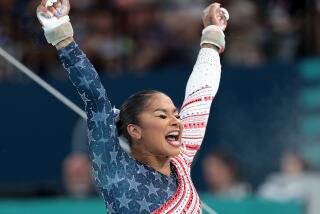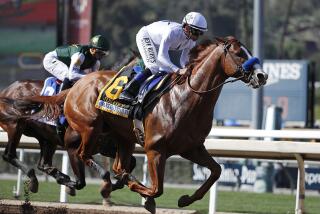Sports court upholds Landis’ doping charges
- Share via
An international sports court upheld doping charges Monday against cyclist Floyd Landis, affirming a laboratory finding that he had taken an illicit dose of testosterone to win the 2006 Tour de France and all but ending his nearly two-year campaign to clear his name.
The three-member panel of the Switzerland-based Court of Arbitration for Sport also upheld Landis’ two-year suspension from competition, backdated to Jan. 30, 2007. That means he will be eligible to resume racing Jan. 29. The arbitrators further ordered Landis to pay $100,000 in costs to the U.S. Anti-Doping Agency, which prosecuted the doping case. It is unclear how that assessment might be enforced.
Landis, 32, is the first Tour winner to be stripped of his title for a doping violation.
The ruling removes a potential shadow over the sport’s anti-doping system on the eve of two international events at which anti-doping measures are certain to take center stage: the 2008 Tour de France, which begins Saturday, and the Beijing Olympics, opening Aug. 8.
USADA Chief Executive Travis T. Tygart hailed the ruling. “We are pleased that justice was served and that Mr. Landis was not able to escape the consequences of his doping,” he said in a prepared statement.
“Clearly this was a foregone conclusion,” Landis said in an interview after the ruling was released. “I refuse to accept that the world works this way. I don’t buy it.” He said he has not decided on whether to pursue further legal options.
But his options are meager. Under the rules of the World Anti-Doping Agency, which governs doping prosecutions in elite international sports, the Court of Arbitration for Sport is the final arbiter. Although Landis can challenge the latest finding in U.S. federal court, the federal judiciary has turned away all previous challenges to the anti-doping system and its arbitration procedures. That path also may be limited by Landis’ dwindling resources: He has said his defense cost as much as $3 million, much of it raised from donors.
Landis, who lives in the Riverside County community of Murietta, won the 2006 Tour de France with a come-from-behind performance in a late stage of the race. Four days later, word emerged that his urine sample from that stage showed evidence of testosterone doping. He immediately declared his innocence and launched the most sustained attack by any accused athlete on the anti-doping system’s science and procedures.
Landis accused WADA’s Paris laboratory, which had performed the analysis on his Tour de France samples, of technical incompetence, bias and fraud. Several of his expert witnesses testified the lab’s performance fell well short of international forensic standards. USADA witnesses, most of whom were employed by WADA labs or held WADA research grants, countered the French lab was in compliance with the agency’s standards.
Monday’s ruling criticized Landis’ aggressive defense, accepting USADA’s contention that his “frontal attack on the entire anti-doping system” had prolonged the case and threatened to make the prosecution “financially ruinous” for the government-funded anti-drug agency. The arbitrators said their $100,000 assessment was a penalty for what they called “the unprecedented scope and intensity of the technical challenges” he raised despite their rejection by an earlier arbitration panel.
Landis said he was taken aback by that aspect of the ruling. “I didn’t expect it to be a personal attack on me and my defense,” he said.
The doping charge was upheld in September by a divided three-member North American arbitration panel, which found the French lab was guilty of numerous errors of procedure and “sloppy practice,” but ruled them insufficient to invalidate the conclusion that Landis had taken synthetic testosterone.
The three arbitrators issuing Monday’s ruling -- lawyers from New York, Paris, and Auckland, New Zealand -- were even more supportive of the lab, which they said was guilty of little more than “minor procedural imperfections.”
Referring to charges by Landis’ attorneys that the lab had falsified documents, fabricated records and deleted important analytical data to support its findings, the arbitrators said they found “no evidence at all to sustain any of these serious allegations.”
The inconsistencies in record-keeping Landis turned up might have reflected “less than ideal laboratory practices,” they ruled, “but not lies, fraud, forgery, or cover-ups.”
--
More to Read
Go beyond the scoreboard
Get the latest on L.A.'s teams in the daily Sports Report newsletter.
You may occasionally receive promotional content from the Los Angeles Times.






